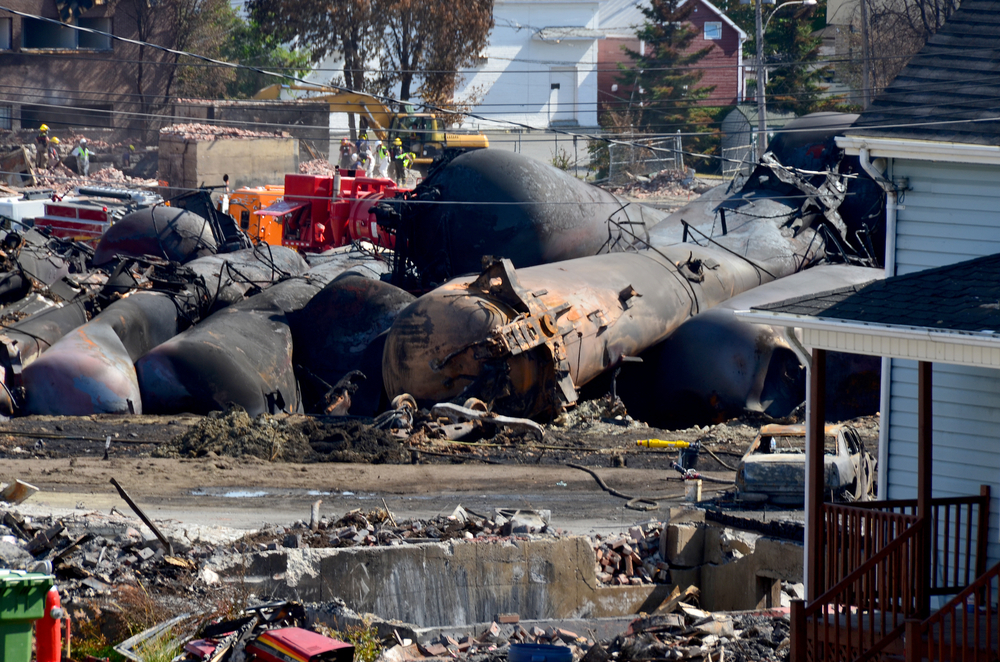Breaking
Judge OK’s $430 million settlement fund for Lac Megantic victims and creditors

Tankers exploded after the wost train disaster in the canadian history on july 14 2013 in Lac Megantic Canada. 50 people was killed in this humanitarian disaster. (Meunierd / Shutterstock)
MONTREAL — The $430-million settlement fund proposal for victims of the Lac-Megantic train disaster is fair and can proceed despite objections by Canadian Pacific Railway Ltd., a Quebec judge ruled Monday.
Superior Court Justice Gaetan Dumas rejected two Canadian Pacific (TSX:CP) motions aimed at stopping the fund, which is earmarked for more than 4,000 victims and creditors in connection with the derailment that killed 47 people in July 2013.
CP said Monday it would review the decision and that it would have no other immediate comment. While the company can appeal the ruling, it will require the permission of an appeals court justice to do so.
Lawyer Jeff Orenstein, who represents the victims of the tragedy, said if CP is not granted the right to appeal, he hopes to have the millions distributed to victims as soon as possible.
“We will push to get the cheques out by the end of the year,” he said. “If it’s possible we’ll do it.”
On July 6, 2013, an unmanned train owned by the Montreal Maine and Atlantic Railway Ltd. (MMA) roared into Lac-Megantic and derailed, with its cargo exploding and decimating part of the downtown core.
MMA didn’t have enough insurance to pay damages to victims and creditors, so it filed for bankruptcy in the United States and Canada. The settlement fund is tied to the bankruptcy proceedings on both sides of the border.
About 25 companies accused of responsibility in the 2013 tragedy agreed to pay roughly 1.
5 million to victims.
The terms of the fund offer all the companies that are giving money a full release from legal liability, in both the United States and Canada, for the disaster.
The fund was unanimously accepted by victims and creditors during a June 8 meeting.
While CP has said previously it doesn’t dispute that families of the victims deserve compensation, it insists it was not responsible for what happened.
Its lawyer, Alain Riendeau, reminded Dumas last month that the disaster “did not involve our tracks, did not involve our rail cars, our products or our employees.”
CP wanted Dumas to declare the ongoing bankruptcy proceedings for the railway responsible for the disaster — Montreal Maine and Atlantic Railway Ltd. — illegitimate.
It argued the case should be heard in Federal Court, not Quebec Superior Court.
CP also wanted Dumas to rule that the settlement fund was unfair because it would have limited its ability to countersue the other firms involved in the tragedy.
The problem for CP is if any of the 25 companies decides to sue it to recoup money put toward the fund, being freed from liability means CP wouldn’t be able to countersue.
Dumas’ ruling on Monday states CP waited too long to file motions against the court’s jurisdiction and the settlement fund terms.
CP was heavily criticized by lawyers representing victims and other companies in the fund for waiting almost two years before objecting to the court process.
“(CP) cannot come back two years later and complain that a judgment has no force — especially after CP participated in the court process,” Dumas wrote.
Moreover, Dumas ruled that his court has jurisdiction to oversee MMA’s bankruptcy proceedings.
On the second motion, Dumas said the settlement fund is fair and “nothing prevents CP from defending itself from actions taken against it in court.”
“If it is not responsible (for the derailment), then the actions will be rejected.”
Orenstein had won approval for a class action on behalf of victims of the derailment and since all other companies will be released from liability, only CP remains to be taken to court.
“Absolutely we intend to proceed in our case against (CP),” he said.
The approved plan would see just under $200 million go to the government of Quebec and the town of Lac-Megantic for cleanup and other related costs.
About 1 million would be distributed to families of the deceased and the remaining millions are reserved for other claims such as psychological and material damages suffered as a result of the train derailment.
As much as $21 million is earmarked for lawyers’ fees.





















